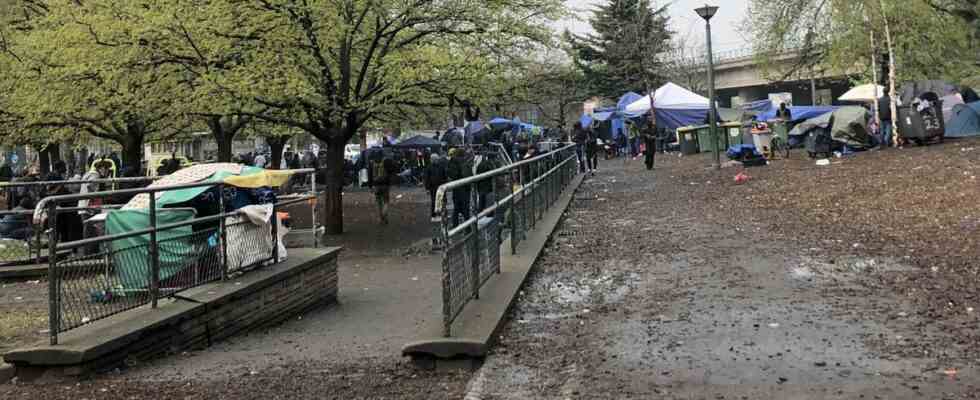It’s a place where you walk quickly, one of those places in the shape of a joint in the city, hostile to strolling and well-being. Here we are at Place Auguste-Baron, under the ring road, at the crossroads of the cities of Paris, Pantin and Aubervilliers. Just opposite the Square de la Villette where for six months have taken up residence fifty people addicted to crack or homeless, expelled in September from the Jardin d’Eole in Paris. A situation that makes the inhabitants of the district cringe, to whom the Minister of the Interior had promised that the situation would last “only a few hours or a few days”.
“They’re disgusting,” said Sarah, in her fifties, bluntly. We can no longer take the metro because it smells too much of wee. We can’t go out at night: before we went to La Villette for a drink now it’s over. And when we go out, we take the minimum in the bag [de peur d’être volé]. “She is currently looking to move, judging the neighborhood” unlivable “.
“We have a lot less customers”
Unlivable is above all the word we would use to describe the situation of the people who live in the square de la Villette. No housing around this square, moreover, has been planted, the place is a kind of no man’s land wedged between the highway and the Paris event center. The noise of the cars is deafening, as heavy as the gray sky of the day. Inside the square, people try to shelter from the rain under makeshift tents, regularly destroyed by the police. Many people cough, and fitness equipment is essentially a seat to sit on. A police car parks nearby and checks cars.
But this police presence is not enough to reassure traders. “Women no longer want to go out,” complains an employee of the Le Magenta café, at the corner of avenue Jean-Jaurès and rue Magenta, just opposite place Auguste-Baron. They stand in front of the café when it opens to ask for coins and people are scared afterwards. We have a lot less customers. Some are aggressive. There are robberies, fights. They bother everyone. »
“Less disturbed than at the very beginning”
At the end of the Square de la Villette, not far from a row of mobile toilets, five men and a woman are seated around a fire, with music playing. Some say they use crack, others don’t. Asked about the thefts and the nuisance caused to local residents, Kamara, one of these men, explains: “I have papers, I worked for a long time as a carpenter. But in Paris, it is more difficult. When you don’t have a place to sleep, you can’t find a job. The police come here and shave everything, so it’s mandatory, whoever steals will go steal. »
Yasser, who works at the central pharmacy in La Villette, has witnessed thefts. He is also “wary” for his safety because he considers people addicted to crack “unpredictable”. But he believes that the situation has improved, especially since one of his colleagues was attacked with a cutter. “We are less disturbed than at the very beginning. I think the cops did what was necessary,” he said.
“There is nothing moving forward”
This is not the opinion of the collective 93 Anti Crack, which highlights a 40% drop in the turnover of local traders and which judges that the situation is “deteriorating”, as summarized by Dominique Gamard, a administrators of the collective. “Macron, Castex and Darmanin don’t care about these people. It is unacceptable to let them live between the ring road and a disused road, ”she thunders. “There is nothing moving forward”, also complains Catrina Tavares, another person from the collective, a pantinoise who works in the office of the town hall of Aubervilliers.
To get out of the problem, the town halls of Paris, Pantin and Aubervilliers, as well as the department of Seine-Saint-Denis, seized the administrative court in February to oblige the State to provide medico-social care for crack users. But they were dismissed last week.

